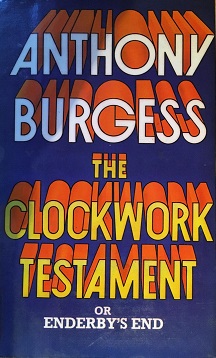The Clockwork Testament, or Enderby's End
 |
|
| Author | Anthony Burgess |
|---|---|
| Original title | The Clockwork Testament; or, Enderby's End |
| Country | United Kingdom |
| Language | English |
| Series | Enderby tetralogy |
| Genre | Mock epic; satire |
| Publisher | Hart-Davis, MacGibbon |
|
Publication date
|
1974 |
| Media type | |
| Preceded by | Enderby Outside |
| Followed by | Enderby's Dark Lady |
The Clockwork Testament is a novella by the British author Anthony Burgess. It is the third of Burgess' four Enderby novels and was first published in 1974 by Hart-Davis, MacGibbon Publishers. It is usually subtitled Enderby's End, as it was originally intended to be the last book in the Enderby series. However, a further sequel, Enderby's Dark Lady, followed in 1984.
Enderby is a dyspeptic British poet, 56 years old, and The Clockwork Testament is an account of his last day alive. The day in question is a cold one in February. He spends it in New York City, where for the past several months he's been working as a visiting professor of English literature and composing a long poem about St. Augustine and Pelagius.
Enderby's present situation arose from a chance encounter with an American film producer in Tangiers, where he owns a bar. Publican Enderby served the man a Scotch and pitched him an idea for a new film—an adaptation of Gerard Manley Hopkins's famously obscure poem "The Wreck of the Deutschland". The producer, intrigued, asked for a script, which Enderby duly composed. The eventual film bears little resemblance to this script or to Hopkins's poem; however, his name is prominently credited, and the film, and Enderby, are now famous.
This unwanted public recognition has led to an invitation to teach English at the University of Manhattan for a year. Also, since the film has controversial elements—including, for some reason, a lurid rape scene with Nazis and nuns—the reclusive, little-read poet has been receiving a barrage of ranting phone calls from angry citizens who are eager to denounce "his" film. Invariably, these callers (and other critics) have never read the original poem; indeed, they don't even know it exists.
Enderby suffers three heart attacks over the course of the day, and succumbs to a fourth some time after midnight. Between attacks, he goes about his business: he happily works on his Pelagian poem; eats dyspeptic American food and smokes White Owl cigars; refuses an offer of sex from a female poetry student who wants him to give her an A; struggles through two lectures; appears on a smarmy talk show; and draws a sword he carries hidden in his cane to defend a middle-aged housewife from a gang of thugs on the subway.
Everywhere—even on the subway—he encounters incomprehension and, usually, disapproval. When he finally gets home, however, a woman he's never seen before drops by and pulls a gun on him; she has come to tell him she's read and re-read all his poetry, and is now going to murder him for writing it. First, however, she orders him to strip naked and urinate all over his collected works. Enderby strips, but since he has an erection he cannot obey the rest of her command. The scene ends, apparently, in a sexual encounter. Enderby dies later that night.
...
Wikipedia
